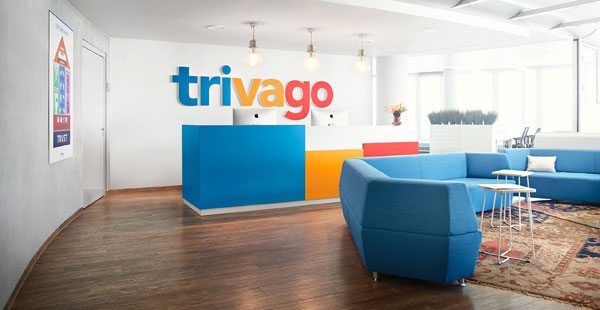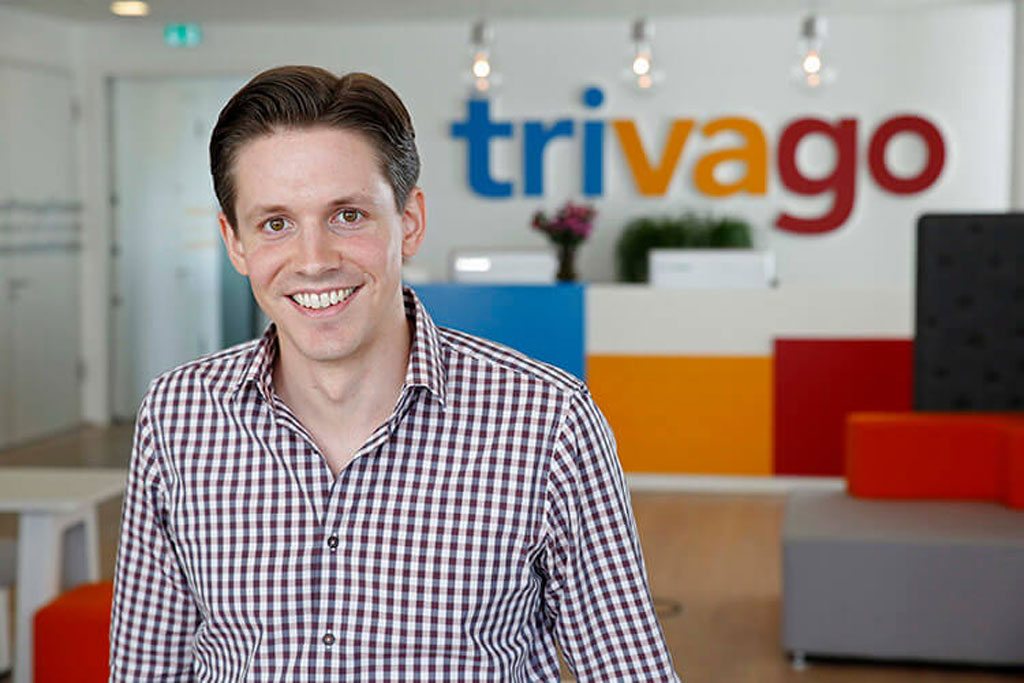Skift Take
How do you stay efficient and maintain core values when your company scales from 700 to 1,100 employees within a year? You get rid of most job titles and fly everyone to Ibiza for the weekend, says Trivago's managing director Johannes Thomas.
On April 4 in London, hundreds of the travel industry’s brightest and best will gather in London for the first Skift Forum Europe 2017. In only a few short years Skift’s Forums — the largest creative business gatherings in the global travel industry — have become what media, speakers, and attendees have called the “TED Talks of travel.”
This year’s event at Tobacco Dock in London will feature speakers including CEOs and top executives from InterContinental Hotels Group (IHG), Norwegian Air, Google, Lonely Planet, Momondo Group, and many more.
The following is part of a series of posts highlighting some of the speakers and touching on issues of concern in Europe and beyond.
Managing director of Trivago Johannes Thomas has thought a lot about startup culture and managing growth. When we last interviewed Thomas in September 2015, Trivago had 700 employees.
Since then, the company has gone on a hiring spree. Its headcount is now above 1,100.
Managing growth at that pace is a challenge, though having fresh capital after the company’s December 2016 initial public offering helps. (The company remains part-owned by Expedia.)
Thomas joined the Düsseldorf-based Trivago in 2011 as global head of search engine marketing and has served as a managing director since June 2015. Previously, he had worked as a marketing executive at isango (since acquired by TUI), a website for booking travel experiences, and he had co-founded a company that operated travel sites in Germany, Italy, and Spain.
We recently caught up with Thomas by phone to suss out how his company manages to maintain efficiency as it scales up fast. We also asked about Trivago’s strategy and its view on startup success as it invests in companies like Base7Booking, a hotel property management software business. Answers have been edited for brevity.
Trivago managing director Johannes Thomas will be speaking about Trivago’s future at the Skift Forum Europe 2017 on April 4 in London.

Skift: What’s this about you building a new corporate campus next to the harbor and the city center, bringing together teams currently scattered across three buildings?
Thomas: Getting top talent into the company, and work environment is today a critical decision-making factor. We want to be competitive in hiring talent. That’s why we’re building an inspiring, positive work atmosphere so people can think openly and freely and inspire each other.
Skift: How do you approach hiring on such a mass scale?
Thomas: We have a title-free company. We’re not removing the structure. You need structure, so work gets organized properly. But we work hard on not having a hierarchy in the sense of status. At other companies, you get a company car, you get a title, and you have a phone, and everything that encourages an individual to feel superior to colleagues. We’re trying to keep walls down and keep everybody equal.
Overall what we are trying in the company is to keep it changing. Nobody is safe in their seat, and next year you have no clue where you will be working.
Skift: In many companies, managers work hard to hold on to their top talent and keep them from moving elsewhere in the organization.
Thomas: We have a rotation program. That is something that we are constantly promoting, so people can kind of sign up for and say, ‘I’m ready for a change.’
At Trivago, there are a lot of people that have been here longer than five years, and who are very talented. If we don’t act and open up fresh challenges for them, they will leave for another company.
That’s where, the fewer hierarchies you have at the company, the easier the rotation is because employees don’t have this fear of losing status.
Certainly, there is expertise that has to be considered in putting the right people in the right place, but, very often, people are maybe not placed in the roles where they can excel. We are helping individuals to understand their strengths and develop into functional roles where they can play to their strengths.
Skift: What is your approach to maintaining company culture as you scale up in size and become global?
Thomas: It’s all about making sure people understand how we want to deal with each other as colleagues. Always repeating our core values, what has made us successful, and so on.
Skift: I hear that Trivago recently sent many of its 1,100 employees to Ibiza for four days last year. What is the value that Trivago gets to having company events like that?
Thomas: It’s one of our biggest company events every year. Every employee looks forward to our annual team events. It has a long history at Trivago. We have been in Italy, Croatia, Sardinia. We chartered a train to ride into the Alps and go hiking there.
It’s quite a hassle to get so many people moving. It’s optional, but by far the majority join.
Skift: Why do you do this?
Thomas: Our philosophy there is, we don’t have a business agenda on these trips, so we don’t have workshops or strategy planning or anything like that. It’s really about team building, bonding between individuals, getting to know each other, and having exceptional experiences together that grows you together as a company.
We do treasure hunts, team challenges at the beach, or just a big pool party where we invite some famous DJs.
What we get out of that, apart from amazing experience that everybody keeps for his lifetime, is we underline our company value of trust.
We think that one of the fundamental parts of human interaction is having trust with each other and being honest with each other, and that’s where.
Our company’s core values are trust and authenticity, so if you’re openly talking to each other, and you’re not hiding information, information flows, you’re saying what you think, you are brave to challenge things, that makes collaboration more efficient. It makes solving problems more productive, you find, you get different views on the problem, and that’s how Ibiza pays off.
We cannot clearly measure that, but we think this trip, which is certainly a
I understand that you are doing something similar at Skift with annual retreats.
Skift: Our founder, Rafat Ali, has led the company on team outings to Iceland, Colombia, and Cuba.
Thomas: Yeah. You’re tearing down walls. It’s a big investment but has the biggest return on investment of everything because it creates a strong trust level among each other. People start knowing each other across departments, and you’re just collaborating way more efficiently with each other, and also, obviously recognizing the hard work everybody has done over the year.
Skift: Advice to people looking to be hired by Trivago?
Thomas: We look to recruit talent that is still early in their careers and still fluent and reflective. You need with an agile mindset and a willingness to continue learning.

LOOKING AHEAD
Skift: While other companies branched out to sell all types of travel, Trivago has stuck to selling hotels. Will Trivago expand beyond hotels?
Thomas: No, we have a clear strategy and mission. So no plans around going for reviews, or going for flights or cars. All about hotels. We believe simplicity is very important.
Skift: What can we expect from Trivago this year?
Thomas: In 2017 we will expand our brand and build our asset there. You’re aware of our strong brand investment. We want to reach the 80 to 90 percent brand awareness that we have in many markets in Europe. In the U.S., today six out of ten Americans know us. We want to strengthen that. You will see more of the Trivago Guy. Sorry for that.
Skift: A majority of your revenue is now from outside your core European market.
Thomas: Yes, and in 2017, we’ll be expanding to many other countries, too. Latin America will be a focus. Asia, Japan, Korea, and Taiwan.
Skift: Why is branding important?
Thomas: We want access to demand, which means travelers are coming directly to our website. Today most of our visitors come directly in our key markets.
Then we want to build an asset around an exceptional search experience that shows you your ideal hotel.
That is a big problem that we think nobody has solved today, so understanding what a traveler wants, understanding what a hotel has to offer, and matching the two as a suggestion. Personalization is a big focus here.
Skift: What’s happening on the business-to-business side?
Thomas: A strong focus for us this year is about improving the competency of our smaller advertisers to compete in our advertising auction marketplace. just as well as the big players.
Skift: Germany is known for having many family-owned businesses. Has there been any challenge for Trivago in being a start-up and having an IPO?
Thomas: In Germany, what you said, you have these family-owned companies, but you also have big corporations, right? There are two worlds there.
We went the IPO route because in the technology landscape you have a different mindset towards that. You have to come to a level where you scale your business. I think that’s when you have to leave the route of a medium-sized company, where … There are a lot of fantastic ones in Germany, but it limits scalability.
Skift: Trivago has a small venture capital arm, which you head up. What have you learned to recognize as being important when you evaluate start-ups and their business plans? Do you have advice to startup founders?
Thomas: Very, very important and potentially number one, who is on the bus? Who are the people that steer the idea to a degree? Do they have the right set of skills to tackle the problem they are addressing, the mission they are following? Do they have the passion and dedication?
To achieve their mission, they have to go through hell in many cases. Scaling a business is extremely difficult and founders need a lot of passion, willpower, to execute it, so that is something we look at in the team. Are they the right people? That’s fundamental.
Second, and this is what has made Trivago extremely successful, are they data-driven? Are they taking decisions based on data and incrementally learning? Are they aware of their customer? Are they aware of what converts, what doesn’t convert? Which marketing channel performs, which does not? In a small scale, building small business cases and proving that there is something where they are adding value to the data-driven aspect. It’s vital that they steer their business to data.
The third one we are always looking into is: Is it a rather static, or a dynamic learning culture? Is there openness, is there critical thinking, reflection, and then this kind of not being afraid to fail, in the sense of failing small, trying a lot of things, experimenting, and then gradually learning and building the business.
That is, which you can see very often, where either you have one very clear thought, how they want to steer the business and all eggs into one basket or are they trying, experimenting, what could be working, and then they use data to prove their hypothesis. Then learning based on that.
So these things: right people, data-driven, and learning culture, are critical. There are many others, right?
Skift: Sure.
Thomas: What is the problem that they are solving? Do they know their customer well? Is the market big enough? And so on. Particularly when we look at Trivago possibly getting involved, we have other questions, such as, is it in line with our mission?
The Daily Newsletter
Our daily coverage of the global travel industry. Written by editors and analysts from across Skift’s brands.
Have a confidential tip for Skift? Get in touch
Tags: ceo interviews, skift forum europe, trivago
Photo credit: Johannes Thomas is a managing director at Trivago, the Düsseldorf-based company that calls itself the world's largest hotel metasearch engine and that is part-owned by Expedia. Trivago

